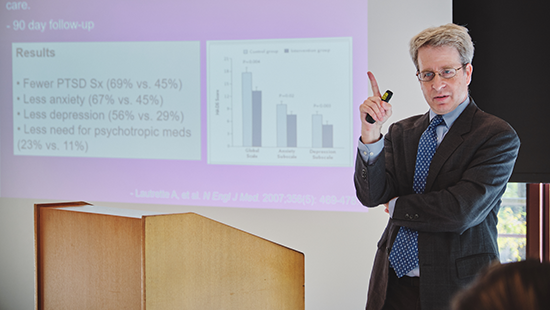Curricula
The EPEC Program developed its core curriculum and its specialty adaptations (e.g., Emergency Medicine, Pediatrics, Veterans and Caregivers) with the support of peer-reviewed grant funding. Since that time, EPEC has evolved into an ongoing, self-sustaining program with national and international reach. EPEC has collaborated with many partners to create specialty and population-based adaptations of the original curriculum in order to expand the scope and range of palliative care by introducing it into new settings and broadening the definition to include the entire spectrum of illness. Today there are more than 3,500 EPEC trainers in the United States and 25 other countries. It is estimated that the EPEC curriculum has reached over 200,000 end-learners.
Core Curriculum
The EPEC Core Curriculum combines didactic sessions, video presentations, interactive discussions and practice exercises. It teaches fundamental palliative care skills in communication, ethical decision-making, psychosocial considerations and symptom management.

Information For
Emergency Medicine
EPEC-Emergency Medicine teaches the essential clinical competencies in palliative care to professionals who work in the emergency department.
Pediatrics
EPEC-Pediatrics is a comprehensive adaptation of the curriculum designed to address the needs of children, their families, pediatric oncology providers and other pediatric clinicians.
Neurology
The EPEC-Neurology curriculum, a collaboration between EPEC and the International Neuropalliative Care Society (INPCS), is available through the INPCS website.Veterans
EPEC for Veterans addresses the specific needs of veterans and their families and consists of 27 modules of core palliative care content.
Caregivers
EPEC for Caregivers aims to improve communication between cancer survivors, caregivers and healthcare providers during the treatment process.